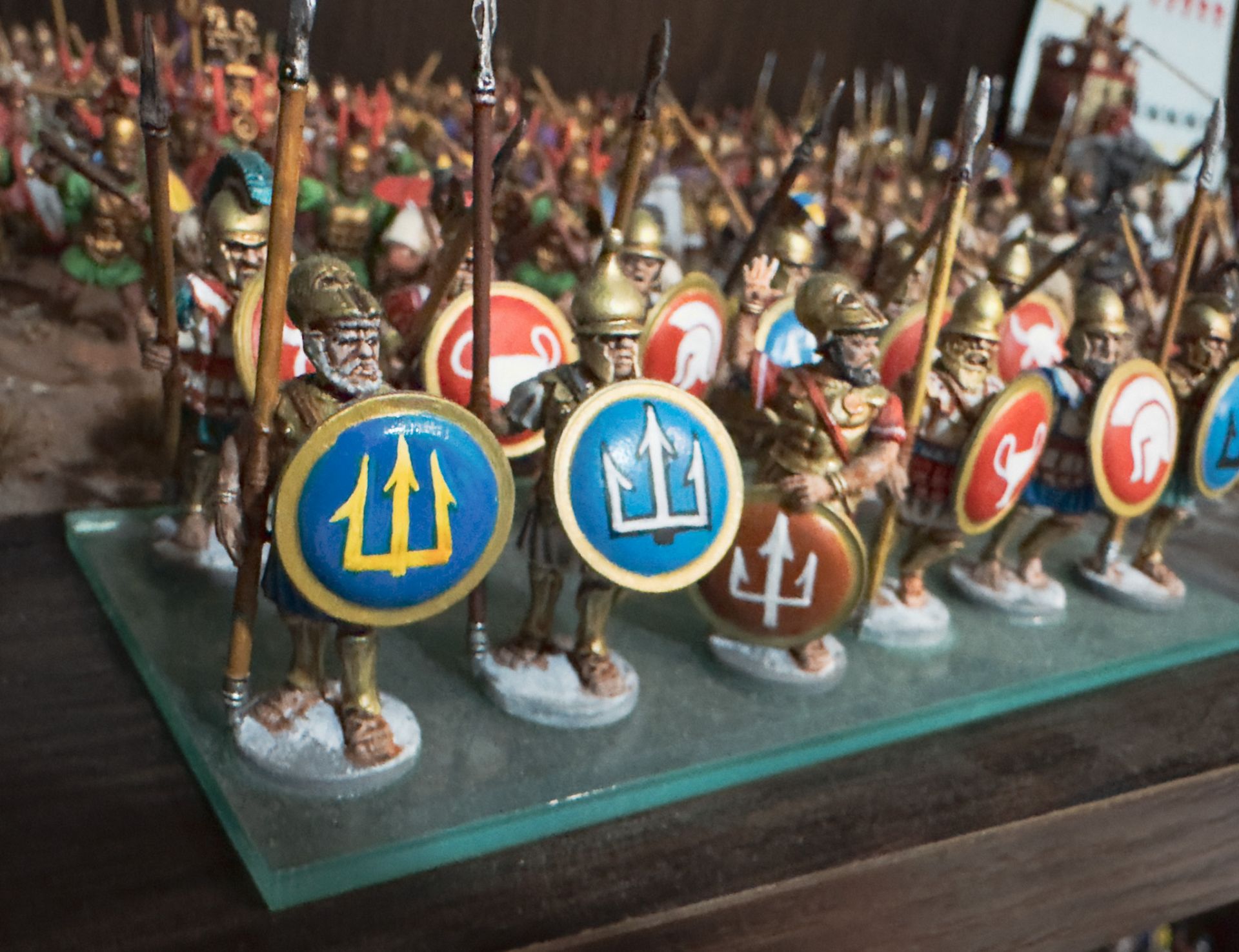In late February 2022, on the eve of Russia’s full-scale invasion of Ukraine, Tasha Dashkyevich, an avid gamer and interpreter, had just finished recording a session of “Mothership,” a sci-fi horror tabletop role-playing game, with her friends. It was their regular pastime, and they had built a small audience of fellow game enthusiasts who followed their YouTube channel, IdeaRoll, and watched them try to survive the horrors of outer space.
The Ukrainians had planned to upload the session in the morning, but when they woke up they were in a real-life titanic struggle to save their country from a modern-day Evil Empire. The stakes couldn’t be higher: victory or annihilation — and this was no game.
It took some wrestling with survivor’s guilt before Dashkyevich, a 37-year-old from Simferopol in Russian-occupied Crimea, decided to combine her love of gaming and the new reality her country faced. Several months after the invasion, she decided to hold her first online session, opening it up to whoever wanted to join. As bombs rained down, about 30 people logged on to watch her and five players survive “Call of Cthulhu,” a game inspired by the dark cosmic horror stories of American writer H.P. Lovecraft. “I was surprised to see a lot of people there, and some of them were IDPs [internally displaced persons], and some of them were veterans,” she told New Lines over Discord, a chat platform popular with gamers. “Somehow, it helped them. There was tons of blood and shit, but everybody was laughing. If it helps to escape reality and somehow switch to those horrors which are more simple and easier to understand than what we have in our actual real-life, then that’s great.”
Tabletop role-playing games (RPGs), are often considered a pursuit of nerdy basement-dwellers in suburban homes. One does not readily associate the likes of Dungeons & Dragons (D&D), Vampire: The Masquerade, and Call of Cthulhu with traumatized people seeking a respite from war. But since the Russian invasion began, these games have transcended mere recreation to help heal trauma, build resilience, form communities and even express Ukraine’s distinct culture. They are not “just games” — they are a lifeline to normalcy and a reminder and promise of better days.
Tabletop RPGs have traditionally been played in person around a table, as newly popularized by the characters in the Netflix sci-fi horror hit “Stranger Things.” But with the COVID-19 pandemic, many games moved online to so-called virtual tabletops. The maps and miniature figures are displayed on screen, while video chat programs like Zoom or Discord allow for real-time interaction — sort of like a conference call with dice.
In June and July of 2023, I traveled to Ukraine to meet with players, many of whom are also game developers and designers. They spoke of how the games had helped them cope with an invasion that seems straight out of “Lord of the Rings.” Indeed, it’s common to hear Ukrainians refer to Russian troops as “orcs,” the ubiquitous bad guys of J.R.R Tolkien’s work. (No one can pinpoint precisely when Ukrainians began calling the Russians “orcs,” but even official statements from the Ukrainian Ministry of Defense invoke Tolkien’s horde, with one report last year stating, “A squad of orcs has been repelled.”)
The gaming enthusiasts told me that D&D is the most popular game in Ukraine, followed closely by Vampire: The Masquerade. The latter allows gamers to play vampires existing in the shadows and struggling against their own nature.
In the capital of Kyiv, I made my way to the Warband Club, a cozy gaming space in the basement of an industrial building on an unprepossessing street corner, where I met Oleksandra Kutsan, a 25 year-old psychologist and co-founder and cast member of role-playing YouTube channel Dice & Bones. She told me how tabletop RPGs can have real benefits for Ukrainians suffering from trauma, post-traumatic stress disorder or general anxiety about the war.
“For them, this community is like home,” Kutsan told me, because of the number of other people also suffering. “And in this space, someone like this can be taught safely to work with other people and to work on social skills and not to feel anxious about it.” She said Ukrainian veterans could also benefit by utilizing their tactical skills in the context of the games.
The club’s co-owner, Olexii Bazovkin, who makes his living renting out space to players and painting miniatures for the games, is a 36 year-old veteran of the current war. He’s now on leave for medical reasons, but proudly showed off captured Russian “trophies” from his time at the front: bits of what he said was a Russian helicopter, a gas mask and the tube of a discarded Russian antitank weapon. It’s a jarring reminder of how uneasily fantasy and reality rub shoulders in Ukraine.
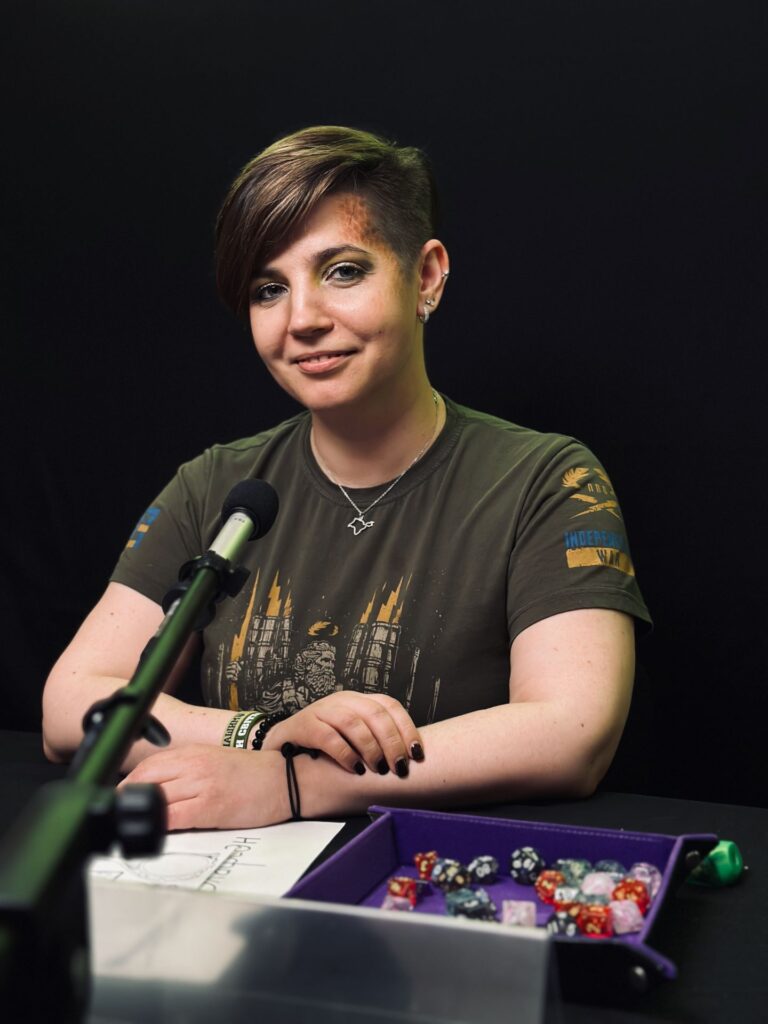
Defending the good is common in tabletop RPGs, which provide hopeful narratives in which small groups can overcome evil, said Dr. Megan Connell, a U.S. Army veteran and author who calls herself a “licensed psychologist and therapeutic dungeon master.”
This hope and sense of agency could help counteract feelings of hopelessness during a conflict. “One of the big, you know, eldritch horrors that we’re dealing with in our real world is hopelessness,” she told me over a video call. “But in these games, in these worlds, you get to bring the hope. You get to bring the light to the world. And that is something incredibly special and incredibly powerful.”
Ukrainians across the country are facing a constant barrage of air raid alerts, bombardments and rockets, and many have dead and injured friends and relatives. With millions of Ukrainians now refugees scattered across the world and the ever-growing fear of “Ukraine fatigue” among Western world leaders, it can be difficult to be hopeful in the face of Russian aggression, which shows no signs of abating. In the depths of the Fifth Dungeon, a themed underground restaurant in the western city of Lviv, 27-year-old gamer Oleksii Marchenko explained this may be why he and others choose to be the heroes of their stories. “It helps to feel this hope. It really helps people with getting through some difficult times,” he told me as we sat inside a building that used to house an actual dungeon. “It’s a way for them to be someone different, to escape from reality.”
Connell noted how powerful play and games can be in helping people cope with difficult or traumatic situations. People who have been deployed in war can feel that their experience has put distance between themselves and others and created a need to reconnect, she explained. Games allow those with that difficulty to participate in a social event where everyone understands the rules of engagement. They also allow veteran players to use that knowledge. “Like, ‘Oh, I know how to set up an ambush, I know how to set up a defensive position,’” Connell said.
Furthermore, having those tactical successes — slaying dragons and saving a town from “orc” marauders — can lend a sense of mastery and competence that is sometimes missing in life during wartime.
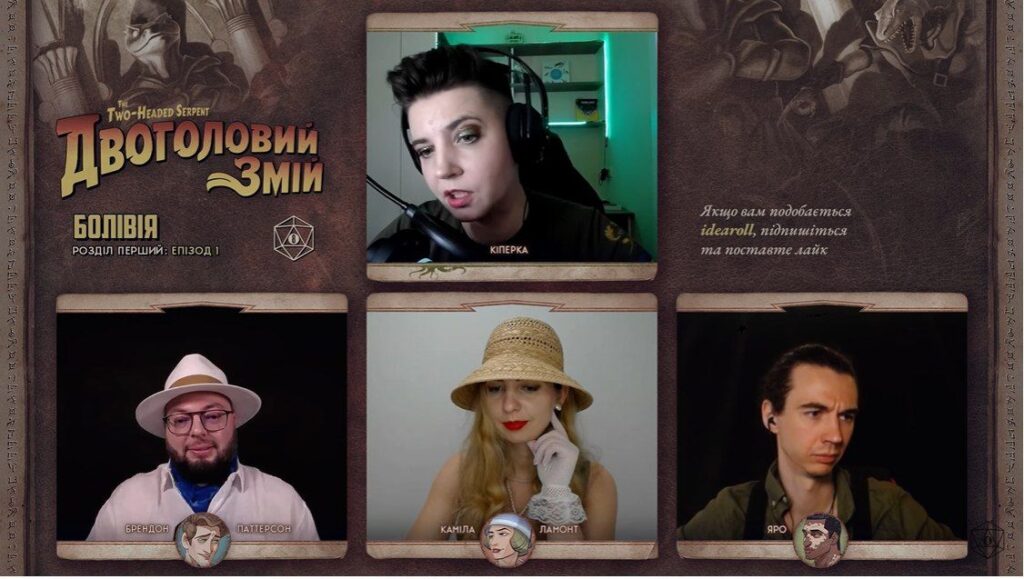
The war — and Russian President Vladimir Putin’s claim that Ukraine is merely his country’s smaller, inferior brother — has created a domestic upswell of interest in all things Ukrainian, forcing a countrywide reckoning that has led to both celebration and examination of the country’s culture.
The gaming community is no exception. After Dashkyevich recorded her “Mothership” session on the night before the invasion, she spent weeks wondering if it was a good idea to upload it to her YouTube channel. Her hesitation stemmed from the fact she and her friends played in Russian, their native language. Before the invasion, she hadn’t thought too much about that; like many other Crimeans, she always identified as a Ukrainian who just happened to speak Russian.
But waking up that morning and grappling with the reality of the invasion, she switched to speaking only Ukrainian, even with her Russian-speaking family. She and her friends eventually posted the invasion-eve episode with an introduction stating that this would be the last episode in Russian. She had always been Ukrainian, of course, but now she needed to express it more strongly than ever.
The reaction among her audience, about 80% of whom are Russians and the rest Russian-speaking Ukrainians, was disheartening. Most said nothing as the war raged on. Others taunted her, writing messages on the online chat platforms Telegram and Discord. She was told it would all be over in two months, when she’d be able to speak Russian again. Others attempted to gaslight her by questioning whether the experiences she was living were real. “How do you know the tanks in the pictures are Russian?” she recalled them saying.
Only three Russians — one woman and two men — wrote to her, apologizing and expressing remorse for the invasion. Dashkyevich said the woman has since fled Russia with her boyfriend while the two men stayed.
Many major game publishers, like the U.S.-based Wizards of the Coast, which publishes D&D, license their content to regions rather than individual countries. Ukraine is lumped together with Russia and Belarus, and since the Russian market is so much bigger, there is no official Ukrainian translation of the D&D rules.
“After the invasion, everyone started … to speak Ukrainian, to play in Ukrainian,” said Tetiana Sopova, 33, who works at a game club in Lviv. She said the Ukrainian community wanted game publishers to understand that Ukrainians are not Russian. In July of 2022, she launched a petition asking Wizards of the Coast to publish D&D in Ukrainian. So far, there has been no announcement from the company that it is considering the petition, and Wizards of the Coast did not reply to my requests for comment.
There are some bright spots, however. In December 2022, Chaosium, the California-headquartered publisher of Call of Cthulhu, announced it would partner with Geekach, a Ukrainian game publisher, to produce a Ukrainian-language version of the game, and made its basic rules free to download in Ukrainian.
Stories like Dashkyevich’s have galvanized many Ukrainian gamers. They see tabletop RPGs as a means to highlight Ukrainian culture and language, which Putin has also denied is real. They want to show their experience to people who don’t know what Ukrainians are going through.
The publishers of Vampire encourage players to create adventures based on their own city, which led 38-year-old Mykyta Kleimenov to use moody, atmospheric Lviv, and its Gothic vibe, for a game set on the night of the invasion. Before the war, the city had a population of about 720,000, which ballooned in the war’s early days as people fled from the east. Today, the International Organization for Migration estimates there are about 160,000 displaced people in the Lviv region.
Kleimenov’s game explores the challenges Ukrainians now face, organized around the question of martial law: What happens to vampires when no one can move around at night? He runs the session online and in English for non-Ukrainians to help them understand and experience how this first night felt.
Marchenko uses stories from the ongoing war when making quests for his sessions. Oleksandr Lazorenko and his friend, 30-year-old Eugene Mokeiev, both from Kyiv, developed an entire Ukrainian add-on for the Vaesen tabletop RPG called Spirits and Monsters of Mythic Ukraine. It is at once delightfully creepy and beautiful, full of creatures like the kolovertii, which are the souls of people killed or cursed, and whose bodies were buried in a swamp, at a crossroads, in a ravine or on a national border. The stories told using these myths are evocative and terrifying and reflect the almost animist Slavic attitude toward the spirit world. While mischievous, such beings can be managed and appeased — by placing a saucer of milk on the front porch in the case of the kolovertii.
The gamers have pushed online platforms for fan-made content to include Ukrainian-language editions. DMsguild.com has at least seven adventures and other supplements for D&D published in Ukrainian, including Xmas Monsters Set in Ukrainian, and DriveThruRPG.com offers a collection of short, humorous Ukrainian adventures titled Fables for the Table, referencing Ukrainian TV shows and fairy tales.
In October, Dashkyevich visited a tabletop RPG festival in Germany where she ran a few games of Vaesen in Ukrainian and played in a streaming session of a Ukrainian mystery scenario.
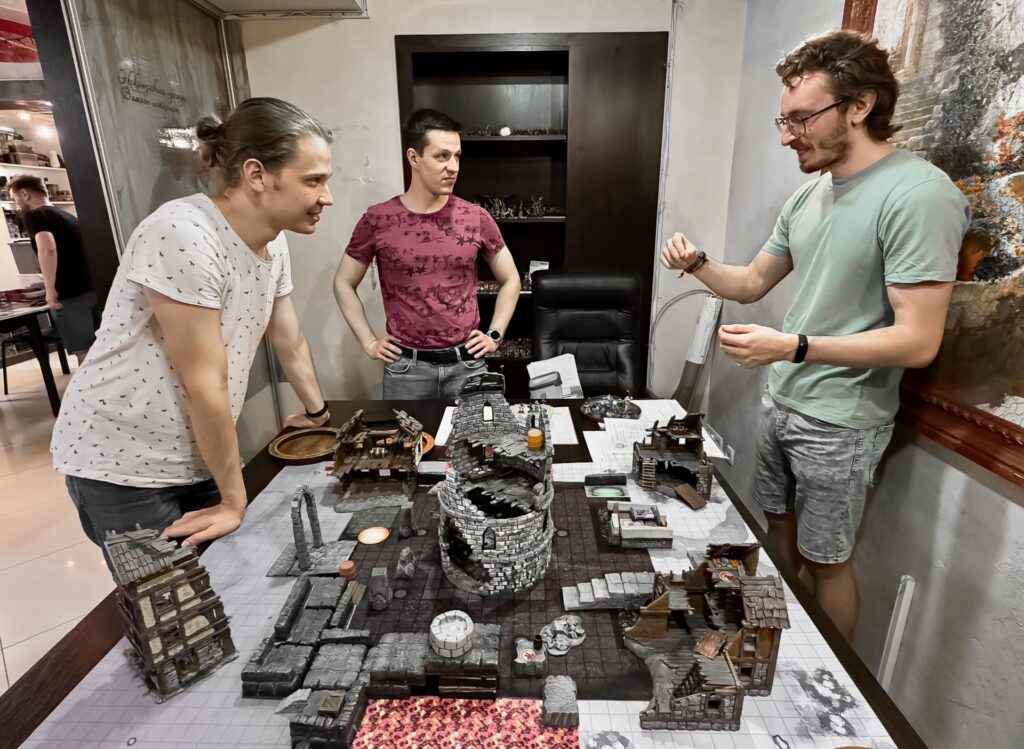
As important as finding confidence is finding a community. Tabletop RPGs have allowed Ukraine’s scattered gamers to reconnect — or connect for the first time — with other Ukrainians all over the world.
Many people from the south and east of Ukraine were displaced when the invasion started. Marchenko, originally from Kyiv, and his wife, Yarnai Reiven, also 27, from Netishyn, a small town about midway between the capital and Lviv, were one such couple. On the second day of the invasion, they fled to Lviv.
“When we moved here we were absolutely alone,” Marchenko said. “It was so depressing.” Finding a group helped him and Reiven cope with their loneliness.
For many players, this newfound community has replaced their old one. The community has been a lifeline for Dashkyevich and many others. “When we were evacuating my family from Crimea, we did not have anywhere to go,” she said, recalling the Russian annexation of 2014. “We did not have any other relatives and, obviously, it was not a good choice to go back to Crimea. A friend from the tabletop RPG community helped us to find a place to stay.”
The robust tabletop RPG scene is not the first time entertainment and real-life violence have become intertwined in Ukraine. The country also has a busy live-action role-playing (LARPing) community. These folks dress up like their characters and run around in the woods, whacking each other with swords and other homemade instruments of mayhem. But during the Maidan Revolution in 2014, when pro-democracy protests erupted on Kyiv’s main square to protest the pro-Russian government policies, many of Kleimenov’s friends, who were active LARPers, went with their homemade sticks and shields to protect protesters from then-President Viktor Yanukovych’s riot police. At least 100 peaceful protestors were killed, which led to Yanukovych’s ousting and flight to Russia.
Today, many of those same LARPers have enlisted in the Ukrainian military to fight what they call the real-life orcs. Kleimenov’s wife is an active LARPer and a combat medic for the Ukrainian army. (She hasn’t lost a patient yet, he said proudly.)
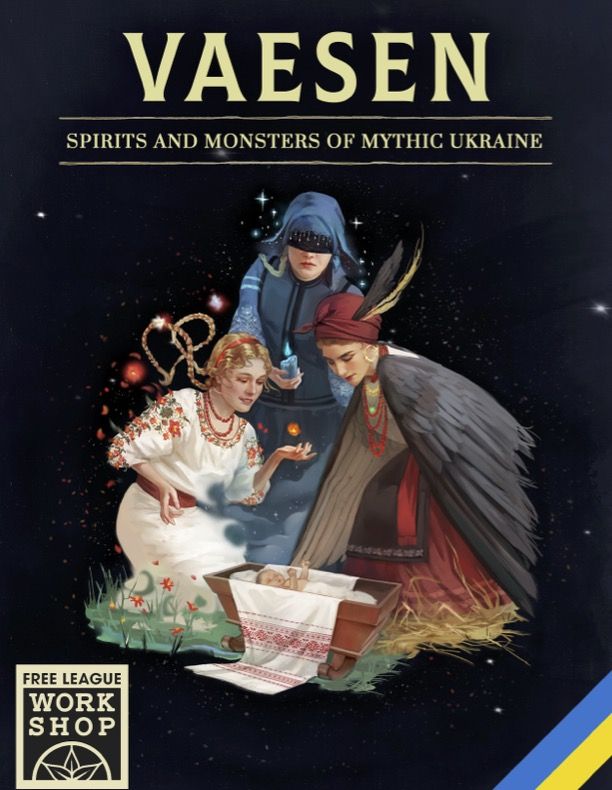
Back in Kyiv at the Warband Club, I sat down with Dashkyevich and Lazorenko for a game of D&D. The owner, Bazovkin, had set up a table in a side room for us. We gathered around an absurdly detailed recreation of a ruined wizard’s tower and surrounding blasted-out homes to participate in an arena fight against one another. I played with Lazorenko, a guy named Victor Bort and a quiet guy named Mokriiev Bohdan. Game on.
At one point, my character clambered up to a balcony on the central tower and plunked two magic arrows into Victor’s fighter character, only to be immediately pushed off the balcony when Bohdan’s character forced open a door behind me, and I failed my saving throw. Down my character went.
Lost in the moment, all that mattered was that I got up on my feet and kept fighting. And for an afternoon, the war seemed very far away.
Become a member today to receive access to all our paywalled essays and the best of New Lines delivered to your inbox through our newsletters.



